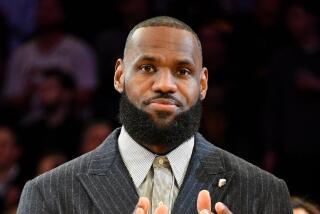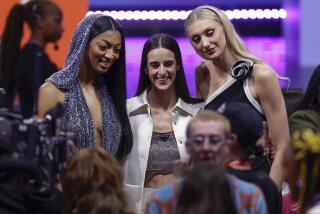Hollywood Confidential: NBA Courts Entertainment Elite
- Share via
Leonardo DiCaprio, hair pulled back in a stubby samurai-style ponytail, and Tobey Maguire, looking anything but cherubic in a scruffy goatee, slink off the court. Another defeat. Their white Laker jerseys are completely sweated through.
Replacing them are Clippers teammates Frankie Muniz from “Malcolm in the Middle” and actor/comedian John Witherspoon--in not one, but two, rather fierce-looking knee braces--warming up for their game against the Blazers.
Court side, in the bleachers, is recording artist Brian McKnight, stepping out of his warmups. His team, in the NBA’s newly minted, closed-to-the-public Entertainment League, is up around 8 p.m., and in the minutes till then, he’s chatting up friends and family. Close by, Deon Richmond, from “Sister, Sister” and “Scream 3,” has finished his game and is just chillin’. “Sometimes,” confides Richmond, “I come a week before to check out the competition’s game.”
For the select group of marquee stars, entertainment execs and other industry insiders who play a 14-week season of Sundays, this is show time, stars stepping into the game, if not the breathtaking feats, of, well, those other sort of stars.
As if the entertainment elite needed yet another charmed circle, the NBA since 1999 has meticulously convened and operated one that’s securely gated and highly coveted. With games that take place at a secret-to-the-public location, the NBA Entertainment League is a precious perk--offered, of course, on an invitation-only basis. The 135 players make up 12 teams with names taken from the NBA roster, their playoff scores to be settled at Staples Center. Contenders don’t have to meet experience or height requirements. Rather, the NBA is looking for the juice that comes with industry affiliation--the right movie or recording credits--and a passion to play.
This is, to be sure, fantasy fodder of the most elaborate sort--uniforms and gear bags, banners and other loot with logos, right down to the regulation black wristbands, headbands and socks, all of it necessary to create just the right aura of verisimilitude. Games are played in two 20-minute halves, and use a 24-second shot clock. It’s Hoop Dreams on a Hollywood budget.
*
As one might imagine, the waiting list is “hundreds long,” says Zane Stoddard, NBA senior manager for entertainment marketing, player and talent relations. The fast pace and glamour of hoops has long been a hot ticket among the entertainment industry’s semi-divines. Who but they can not only afford season floor seats at a Laker games, but also have the ubiquitous faces that capture a TV audience’s attention. Spotting Jack Nicholson in his sunglasses, most certainly, has long been an interactive family version of “Where’s Waldo.”
And for some high-priced fans, it was a short step into the realm of high-priced fantasy. “One thing that we realized early on, and it’s funny: Not only do basketball players want to be stars,” says Gena Gatewood, coordinator of strategic and corporate communications for the NBA, “but stars want to be basketball players.”
Many who were once satisfied with tennis courts or custom-designed swimming pools now view a regulation two-hoop court as a crowning touch for the well-equipped manse, and the game has muscled to the forefront of celebrity-filled sports diversions that have long ranged from weekend softball to the late-night hockey Mafia. There is no shortage of pickup basketball, and other b-ball leagues abound. “People play at gyms that have been rented out or at some producer’s home. They develop reputations,” says Stoddard, “And, it’s there--it just so happens--where the deals are done.”
Forget country clubs and their manicured links, low-lit, mahogany-lined cigar lounge/bars and remotely situated lavender scented spas. Basketball is in its moment. Or, as Stoddard puts it: “Basketball is the new golf.”
*
With that in mind, he says, “we set out with the hope of having the best game in town.” And in just four seasons, they seem to be making good on the promise. Membership comes with beaucoup privilege--NBA-style uniforms, Entertainment League T-shirts, and even a replica of the NBA championship ring for those who make it that far. “We like to refer to it as the Make a Wish Foundation for grown-ups,” says Stoddard.
The league opens its arms wide to writers, agents, producers and the like. Guy Starkman, owner of Jerry’s Famous Deli, has a spot on the roster, his establishment being a central networking spot itself. But there is a special place for actors, whose cachet is crucial to the inevitable charity and fund-raising end of things. One of the reasons that the NBA is now seeking outside publicity for a league that had at first been kept just about whisper quiet is the ever-rising profile of its participants, which results in increasing requests to stage games as benefits.
And that’s where the we’ll-scratch-your-back-if-you’ll -scratch-ours dynamic comes into play.
It’s quite clear what the players get out of this--cool togs, a community of similar-minded, basketball-obsessed folk who share a stratospheric lifestyle. The NBA, for its part, hopes that this sort of synergy, if you will, will help raise basketball’s presence in films. Or help pro players garner recording contracts. Or produce writers who can turn out scripts with solid inside knowledge of the game, as well as producers who might be inspired to look for drama in a different sort of court.
*
Most certainly the actors have got the superstar gait down, that slow-motion saunter as they arrive at the gym, heavy bags slung over their shoulders. Woody Harrelson, just getting over a bout with food poisoning from the night before, meanders in just in time to take part in the second half of the Nets’ game against the Sun and chats a bit. McKnight’s got it down too, the saunter and wave at the stands.
But for all the high profiles and star quality, what is most remarkable is just how unremarkable it all is. These back-to-back games have the intense feel of a dedicated park pickup cycle.
“Ego? Everyone pretty much checks it when they get here,” says Richmond, relaxing in the stands after his team won by two points in overtime. “Especially when you’re running after the ball, sweatin’ and can’t catch your breath. . . .”
But inevitably, there is a hierarchy. People like Maguire and DiCaprio, for example, play and lend their names to the roster and boost the league’s profile, but use of their image is carefully monitored by their publicists. And already, as could have been predicted, those who don’t have the right sort of credits, or who simply can’t get on the playing roster because of its cap, have begun to express their distaste.
“I was outside talkin’ to one guy and he’s got his Bentley, a wife, a child parked in the middle of the street and wants to play,” says Richmond, “And you got [other] players who are protesting cause they can’t get their boys in. And I’m like, ‘Look, you’ve got a Bentley, a wife and a child. . . . Put it in perspective.’ ”
*
Stoddard is well aware of the clamor. And trying to keep a balance and smooth egos is a full-time job of its own. The popularity, he says, is “a blessing and a curse.”
The league has already worked its spell, to be sure. Players are fully focused and highly competitive. Maguire, who’s a team captain, “asked if I had suggestions for who could coach his team,” Stoddard says. “I gave him the name of one of [Philadelphia 76ers coach] Larry Brown’s assistant coaches from when he was with the Pacers, Bruce Fraser. They’ve started a new series of practices and run NBA offenses.”
Some find time to practice solo amid their tightly packed schedules. And a great many go to great lengths to make it to games--despite work commitments that take them time zones away.
Already there is league lore. McKnight had a game scheduled for the same night as an appearance at the American Music Awards. He took the risk and attended the awards. Won one. Then he boarded his plane for the game, making it in time to suit up and play.
It’s a pull familiar to Muniz. “I’ve been in New York and I came back this morning just for this game,” he says, already suited up down to his socks and headband (“They don’t have them, they don’t play,” says Stoddard.) This is his first year in the league, but he has been playing basketball “since I can remember.” Here, “I feel accepted. Like if I go to the park to play, people think, ‘Oh, it’s some kid who thinks he can play.’ Well, I’m thinking, I can probably beat all of them.”
*
And that’s what life in the league gets pared down to, which is why Richmond is so taken by it all. Sitting on the step, leaning against the seat above, he studies the scene. With about five minutes left in the half, writer/director Nick Cassavetes is in the ref’s face, thumb gesturing to a smirking actor, Cylk Cozart. “You need to tech [technical foul] him. He needs to stop talking.”
Richmond, who’s been playing since the uniforms were “shabby and cheesy,” has watched the steady progression. “The more it becomes like the NBA, the more people will want to be part of it. Every year it gets better. The players get better too.”
Opening some of the games up and taking them on the road for charity--the NBA’s next plan, he says--makes good heart and pocket sense. But opening the at-home games to the public, he fears, would break the spell. “You let the public in here, the egos come back too.”
In a setting like this--toddlers making a fast break across the bleachers, or Maguire’s girlfriend, Kirsten Dunst, giving the play-by-play of what really happened behind the scenes at the MTV Movie Awards--the veneer, and fears, get peeled away and you get to know the “who” behind the name, the person inside.
And what’s inside, says actor Donald Faison (“Felicity,” “Josie and the Pussycats”) “is beautiful. I mean, I’ve never had an opportunity to sit down and talk with other actors on different levels about the tricks of the trade. I’ll be honest--I’m meeting people I would never have imagined I would have met.”
But in the pressure of the game, it comes down to a different set of tricks--you keep your mind on the clock and your eye on the ball. That brings all the hype down to earth. “I mean we’re actors. . . ,” says Faison. In other words, no one’s a secret weapon out of nowhere--”No one’s going to go left on you. But I’ll be honest. The best thing is to be able to go home and call my mom and say, ‘Guess what, he may be a big star, but I beat this cat in basketball!’ ”
More to Read
Go beyond the scoreboard
Get the latest on L.A.'s teams in the daily Sports Report newsletter.
You may occasionally receive promotional content from the Los Angeles Times.










